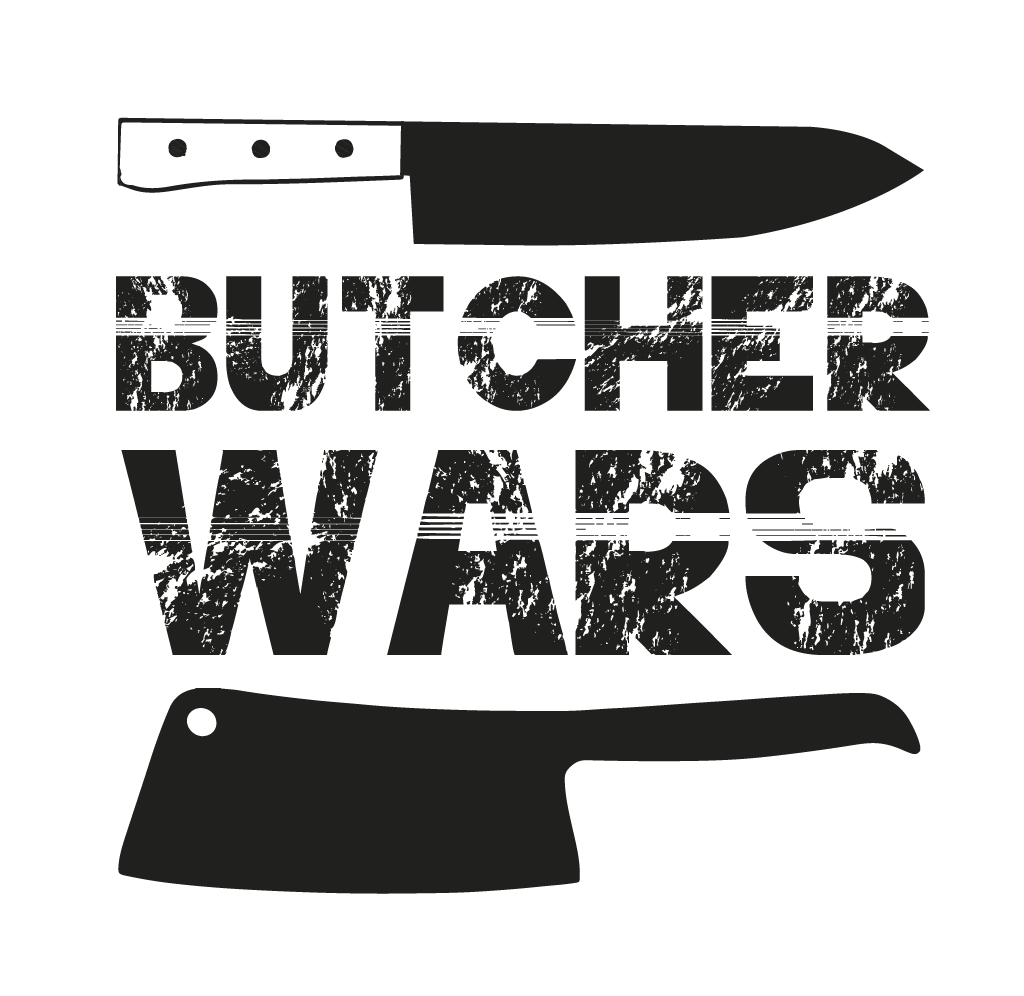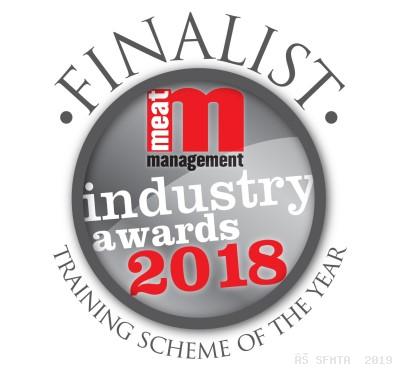2008 STUART CHRISTIE ELECTED SFMTA PRESIDENT
Stuart Christie of Christie Meats in Hardgate, West Dunbartonshire was elected President of SFMTA on 30th November 2008
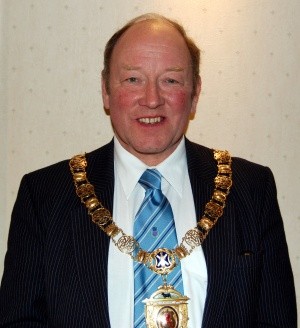
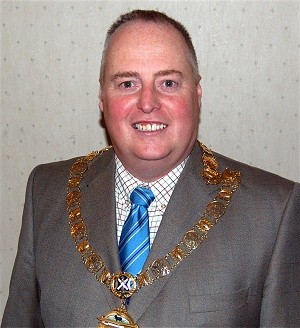
Stuart Christie (left) and outgoing President Jamie Chapman
|
Honoured
guests, ladies and gentlemen. My
first task as President is a very pleasant one – to present Past
President Jamie Chapman with his President’s Medal. Jamie is the 3rd
generation and 4th member of the Chapman family to hold this
post. A remarkable achievement. Over the past 2 years he has led the
association with dedication and professionalism and he will be a hard act
to follow. Thank you, Jamie. On
looking over the names of the past presidents I saw another Christie,
president from 1938 to 1940. Tom Christie came from Kirkcaldy, and to the
best of my knowledge was no relation. The issues of the day were somewhat
removed, too: cooling of meat in abattoirs and centralising slaughtering.
They also discussed imported meat, but could not agree that agriculture
was in ‘an unfavourable condition’ and required support. Changed days
now. Tom
Christie chaired the emergency committee and finances committee and was a
member of the parliamentary committee, propaganda committee and technical
education committee. Oh, and in those days there were 8 members on the
hide committee. During
my period in office I would like to forge closer ties with farmers. I come
from a livestock background and I know that too many farmers perceive
butchers as creaming off an unfair amount of the profit that comes from an
animal. Not all, but some, believe that they breed, feed and nurture a
beast for over three years before they receive any return from it. In
their eyes the butcher buys the beast and in a little over three weeks
receives his return. They fail to realise that we require more labour per
animal processed than they do, that we have rates to pay on every square
inch of our premises, substantial utility bills, cleansing and waste
collection charges, and in larger licensed premises Meat Hygiene Service
charges to boot. Greater understanding of the processes, objectives and
constraints of both sectors would seem to be mutually beneficial. At
the instigation of SFMTA, the Scottish Meat Industry Liaison Group was
formed some years ago. This was a meeting of farmers, butchers, meat
wholesalers, auctioneers, livestock removers and the NFU. It met about 2
to 3 times a year, and in my opinion was a good way to discuss, and
hopefully sort out, our differences and problems. Sadly it has not met for
some considerable time, although not without some considerable lobbying
from us. I would like, with the help of QMS, to restart these meetings as
soon as practical. Since
2001 we have had foot and mouth, avian flu, e.coli, foot and mouth again
and now blue tongue to contend with, not to mention the worst summer for
many years, with some harvest still lying in fields in November. Farming
has always been a precarious way of life and no doubt always will be. Our
government does not do a lot for it, and I think that is good reason why
we must all work more closely together. Whether that is through the
Scottish Meat Industry Liaison Group, ourselves, the NFU or the farming
press and Quality Meat Like Past President Chapman I am a great believer in the livestock auction system. There you can choose your own animals and bid what you think they are worth. It allows the farmer to sell his stock, the butcher to satisfy his needs and supports the local abattoir and wider local economy. The supermarkets don’t like this system and what they perceive as its weaknesses – price, quality and size volatility – we can see as its strengths. It allows us to demonstrate that we buy locally, that we choose what we want and that we are seeking to reduce food miles and the resulting ‘carbon footprint’. � I’m
not denying meat wholesalers the vital role that they play in supplying us
all – but then they’ve used the market system for years and
demonstrated its strengths. I hope to instigate a ‘buddying’ scheme
where butchers who use the market system take along butchers who don’t.
They may not feel that the system is for them, but it will give them a
knowledge of the system their suppliers use that they can pass on to their
customers. It’s also a good day out and can perhaps be extended to other
functions of our trade. While
our industry may have its problems and challenges, we can be secure in the
knowledge that as an organisation we are doing our very best to equip our
trade with the skills and the staff for tomorrow. In Scottish Meat
Training and its seven staff we have the best organisation for training
young butchers in the In our convenors we have a wealth of knowledge: Alan Kennedy on livestock, Jamie Chapman as treasurer, Beaton Lindsay on Membership and Development and now Duncan McKenzie on Promotions. Every month these chaps keep us informed of all the latest news, ideas and prices that affect us all.� It
is a pity more butchers can’t come to the meetings of the Federation to
hear these reports ‘live’ as I’m sure they would gain a lot from
them. Fortunately for those who can’t attend they can always consult our
monthly newsletter. I call it a newsletter, but under the editorship of
Douglas ‘Beaverbrook’ Scott it has taken on the dimensions of a Sunday
supplement, thankfully without the adverts for stairlifts and bath chairs,
but with all the information the trade could require laid out in a
professional and informative manner. Thanks must go to We
are pleased to list amongst our ranks 21 corporate members, who for a
small fee have access to our newsletter and membership lists. I should
like to try and increase this class of membership. There are a lot of
businesses out there who would benefit from us as an audience and we need
to make them aware of that. Over the years the number of butcher shops has decreased considerably, we are all only too aware of that fact. But it’s not only butchers who have been affected, fishmongers for instance have all but disappeared, and greengrocers are not too far behind. The culprit? The supermarkets. But they are perhaps best described as the weapon in the attack rather than the perpetrator. They couldn’t have flourished if they didn’t offer something the consumer wanted. However, their size and power have now made them the dominant force in retailing: they are capable of dictating to their suppliers both prices and payment terms and of running promotions where the supplier foots the bill. But what they don’t have, and what we have in spades, is professionalism and a dedication to our trade.� We buy the best and we butcher the best. We mature it longer, cut it better and present it with pride. We don’t gas-flush pack, sling it on a refrigerated shelf and make the option to the consumer quite clear – take what we sell or go somewhere else. For a long time the consumer felt either that going somewhere else was either too much trouble or merely meant going to another supermarket to be faced with the same prospect. That is no longer the case.� We
as a trade are now much more visible. The shopper is now much more aware
and interested in where their food comes from, how it was prepared, and
what they might do with it. We are the perfect people to tell them,
because supermarket shelves aren’t very good at answering questions. Lastly,
I would like to thank Douglas, Bruce and all the staff in |
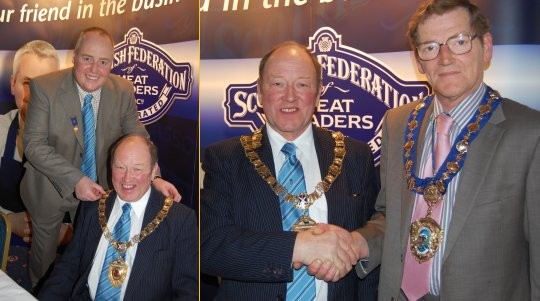
President Stuart welcomed NFMFT President Philip Edge
views: 4,565

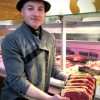






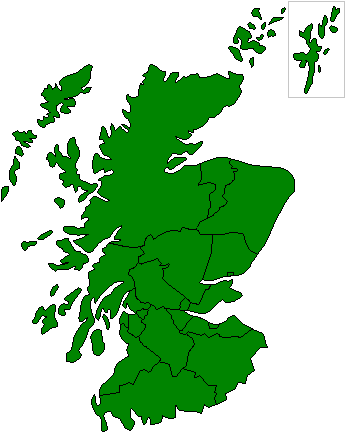

_2082_1403.jpg)
